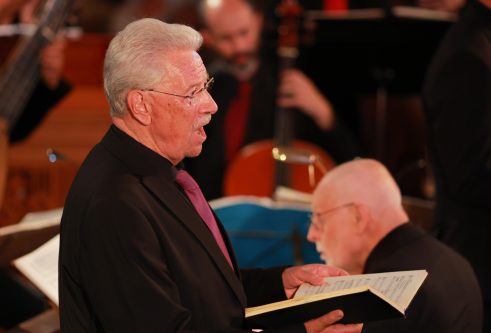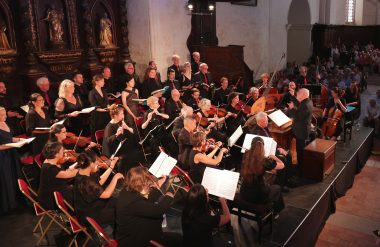 France Itinéraire Baroque en Périgord, 2024 [5] – Bach, Johannes-Ardour, BWV 245 (1724): Amelia Berridge (soprano), Sophia Faltas (mezzo-soprano), Tilman Lichdi (tenor), Klaus Mertens (bass), Amsterdam Baroque Orchestra & Choir / Ton Koopman (conductor / harpsichord). Église de Saint-Astier, Dordogne, France. 4.8.2024. (CC)
France Itinéraire Baroque en Périgord, 2024 [5] – Bach, Johannes-Ardour, BWV 245 (1724): Amelia Berridge (soprano), Sophia Faltas (mezzo-soprano), Tilman Lichdi (tenor), Klaus Mertens (bass), Amsterdam Baroque Orchestra & Choir / Ton Koopman (conductor / harpsichord). Église de Saint-Astier, Dordogne, France. 4.8.2024. (CC)

Ton Koopman is not any stranger to the St John Ardour: his 1993 recording (which additionally options Klaus Mertens as a soloist) has achieved notable standing within the report lists. We’re a way on from 1993 now, after all, and it was fascinating to listen to Koopman’s most up-to-date ideas on Bach’s magnificent rating (a rating I, for one, rank above the St Matthew).
With age comes knowledge (Koopman celebrates his eightieth subsequent 12 months – previous age for many however sort of middle-aged for conductors: one anticipates a Günter Wand/Herbert Blomstedt-like decade or so of Indian Summer season exercise nonetheless). There was a tranquillity to Koopman’s St John Ardour which general looked like a very nice efficiency though on the person second stage, this might result in a lessening of drama. There was technique right here, one instantly obvious within the opening refrain (‘Herr, unser Herrscher’). The preliminary tranche of woodwind dissonances had an impact, for positive, however not a contact on Suzuki’s instantly pre-pandemic St John on the Barbican (overview). Koopman’s plan was broader: their return reduce to the short. This was his structural plan in microcosm: right here is somebody who hears the totality and plans accordingly. And the way it labored. The Amsterdam Baroque Choir was excellent all through, the music of their blood in addition to their throats, at all times expertly balanced, at all times immersed within the music, providing chorales of infinite solace: ‘Dein Will gescheh’ from Half One was so rigorously and lovingly sculpted, for instance. Maybe the second half micro-chorus ‘Nicht diesen sondern Barrabam!’ and the later ‘Wir haben ein Gesetz’ may have been clearer (the extra readability at supply, the extra probability of the projection to the again of the huge house).

Klaus Mertens, already heard to high quality impact within the pageant, was an excellent Jesus, his each phrase clearly audible (in equity, I used to be sitting close to the stage: Saint-Astier is huge and one that features acoustic traps for the viewers, though I think about his projection discovered most locations). Nevertheless it was the Evangelist of Tilman Lichdi (a singer once more heard earlier within the pageant) that actually impressed. Not simply the diction right here, however the which means of each phrase carried weight. This can be a vital story, he appears to be saying, a legend that holds a lot for humanity, if solely we hear.
There was a last-minute substitution: soprano Elisabeth Brauer was changed by Amelia Berridge, silver-voiced and clear (within the attractive ‘Zerfliesse, mein Herze, in Fluten der Zähren’, with its sheaf of woodwind obbligato devices permitting the Amsterdam orchestra to point out its excellence). Berrridge additionally delighted within the beautiful, mild aria, ‘Ich folge di gleichfalls’, garlanded by Kate Clark’s obbligato flute strains and negotiating the harmonically difficult moments simply.
Dutch mezzo/alto Sophie Faltas felt too quiet, although, significantly in ‘Von der Stricken’. The alto’s most poignant solo, although, is definitely the Half Two ‘Es ist vollbracht’, during which the soloist acts in partnership with the viola da gamba solo (Smith once more). This was utter magic, two voices (just one with phrases) in good accord.
The orchestra was past criticism, Caroline Manson an outstanding chief, the professional Robert Smith (of whom I wax lyrical elsewhere on this pageant report), Mike Fentross on lute and Tini Mathot on organ (with Koopman himself doubling perform on harpsichord).
It’s the choir that has the final phrases: am prolonged refrain (‘Ruht wohl’) adopted by a refrain (‘Ach Herr, lass dein lieb’ Engelein’). This passage, collectively over ten minutes, appear to sum up the comfort and utter serenity exuded by this efficiency. If this serenity was the underlay of every part to date, right here it flowered, coming centre-stage to create a sonic plateau that transcended time and, certainly, particular person religions, taking us to a higher spirituality.
Magnificent.
Colin Clarke


